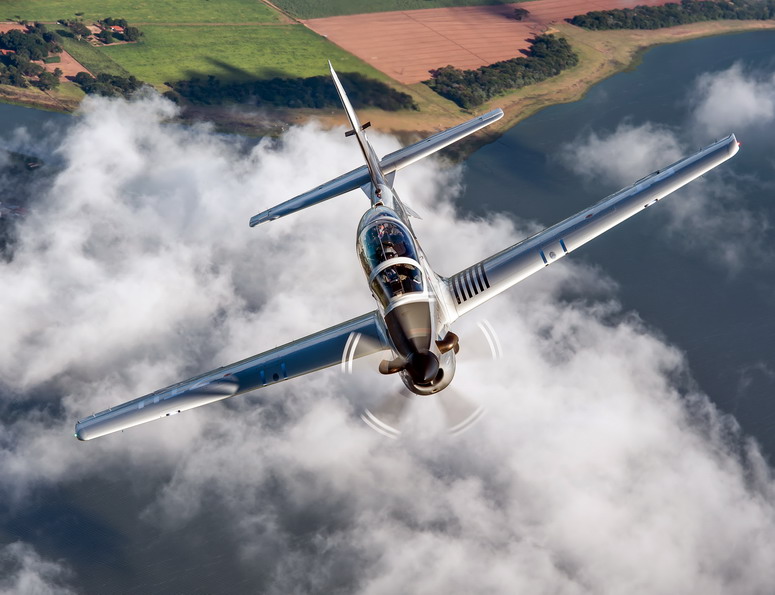Embraer has signed a contract for the sale of four A-29 Super Tucano light attack and advanced trainer aircraft to an undisclosed customer in Africa, which will use them for missions such as border surveillance, intelligence, surveillance and reconnaissance (ISR), close air support, counterinsurgency, and advanced flight training.
The Brazilian company made the announcement on 31 December, noting the customer will become the sixth operator of the Super Tucano in the African continent after Angola, Burkina Faso, Mali, Mauritania, and Nigeria.
Ghana has previously expressed interest in the Super Tucano, and had the aircraft demonstrated to its air force in February 2024.
“The A-29 Super Tucano is an extremely versatile aircraft that is able to carry out the most challenging missions under the most demanding conditions. It is the world leader in its category as it combines a combat-proven track record with advanced technology,” said Bosco da Costa Junior, President and CEO of Embraer Defence & Security.
Embraer said the Super Tucano is suitable for a wide range of missions such as close air support, air patrol, special operations, air interdiction, forward air controller (FAC), air and tactical coordinator (TAC), armed ISR, border surveillance, reconnaissance, air escort, basic, operational and advanced training, transition to air superiority fighters, lead-in fighter and FAC training.
The Super Tucano continues to accumulate orders, with Embraer in 2024 announcing new sales to the Portuguese Air Force (A-29N), the Uruguayan Air Force and the Paraguayan Air Force. On 30 December, an undisclosed customer ordered six Super Tucanos for delivery in 2026.
More than 290 Super Tucanos have been ordered by nearly two dozen countries and the type has accumulated more than 570 000 flight hours, with 60 000 of those in combat. The Nigerian Air Force alone has flown 10 000 hours, reaching the milestone in August 2024. First taken into Nigerian Air Force service four years ago, the Super Tucano has logged over 8 500 hours in day and night sorties against terrorists, bandits and other violent non-state actors threatening national peace.
Burkina Faso was the first African country to take delivery of the Super Tucano, receiving three aircraft in September 2011 for border patrol missions. In October 2012, Mauritania received its first of two aircraft, featuring sensor turrets for surveillance duties, although they have also been used for counter-insurgency missions, particularly against al Qaeda in the Islamic Maghreb. They replaced older Tucano aircraft.
Angola became the next African country to receive the type, with the first three of six aircraft arriving in April 2013. Angola acquired its Super Tucano aircraft for border surveillance missions, augmenting a fleet of 14 older Tucanos.
In July 2018, Mali took delivery of four Super Tucanos following a 2015 contract as part of the rejuvenation of the country’s military. They are configured for light attack and close air support.
Africa’s largest Super Tucano order came from Nigeria, which ordered 12 from the United States in 2018 under the Foreign Military Sale (FMS) programme, with the aircraft manufactured by Embraer and modified by the Sierra Nevada Corporation in the US. The first six Super Tucano aircraft arrived in Nigeria in July 2021 and were inducted into the Nigerian Air Force at the end of August.
Developed in response to the demanding requirements of the Brazilian Air Force (FAB), the A-29 Super Tucano is equipped with a variety of fourth generation avionics and weapons, including an electro-optical/infrared system with laser designator, night vision goggles, secure communications and data-link package. Its systems allow the gathering and sharing of time-critical information, and the aircraft can operate as part of a networked environment.
Armament comprises one 12.7 mm machinegun in each wing. Five hardpoints can carry a maximum external load of 1 550 kilograms. Weapons options include gun pods, bombs, rocket pods, and (on the two outboard stations) air-to-air missiles.
As the Super Tucano was designed from the start to have a light attack capability, it features built-in machinegun mounts, self-sealing fuel tanks and armour in critical locations. Its combat abilities have been well proven in Afghanistan and Colombia, during Amazon protection operations in Brazil and counter-narcotics operations in the Dominican Republic and Brazil, amongst others.



